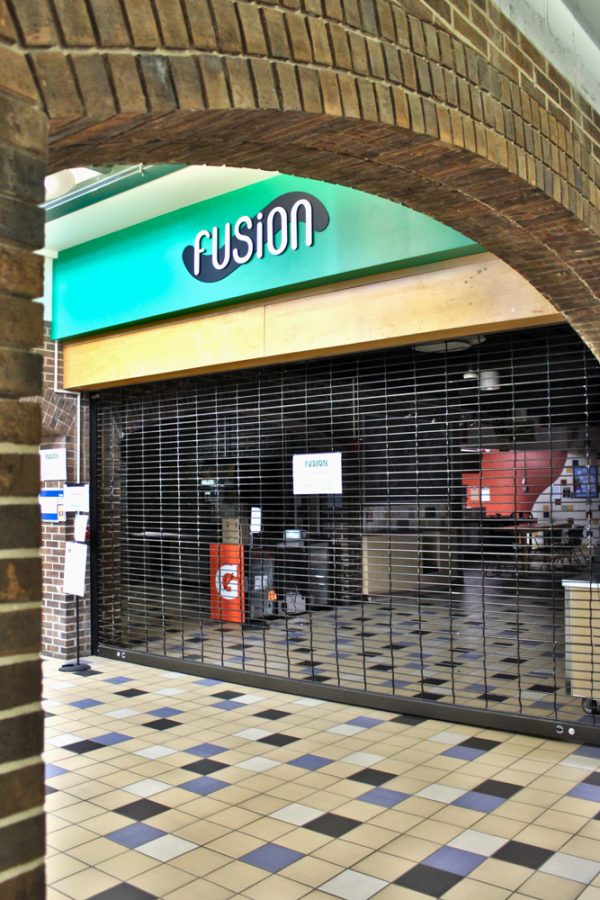Student organizations call for change from Campus Dining
Sep 27, 2021
Following the general frustration with Campus Dining, Students for Food Sovereignty (SFS) has resumed its efforts to terminate Grand Valley State University’s contract with Aramark, a national food service provider, and implement a self-operating dining system.
Aramark acts as the “middleman” between GVSU and the companies that supply food for its various dining locations. They control where the university’s food comes from and are responsible for hiring and training employees. While many past employees have taken to social media these past few weeks to discuss their mostly negative experiences with working for Campus Dining, SFS takes issue with the operations of Aramark.
“I think that Campus Dining issues like availability for students, the way they treat their staff, the way they prepare their food, and the quality of the food that’s prepared is just the tip of the iceberg and Aramark is the rest,” said Alex Hicks, Vice President of Operations for SFS.
Besides providing food services to universities, Aramark holds contracts with prisons and correctional facilities across the United States and in turn, profits from the prison industrial complex. Governor Rick Snyder cut Michigan correction’s contract with Aramark early due to “health code and human rights violations,” such as reportedly serving maggot-infested food to inmates.
There have also been reports of Aramark working with incarceration facilities that have beds for U.S. Immigration and Customs Enforcement (ICE) detainees. This fact is very concerning for Hispanic students at GVSU and has been a long-running issue among members of the Latino Student Union (LSU), many of whom feel that a contract with Aramark goes against the university’s values of inclusion and contradicts their claim of being a safe haven for DACA students.
“As a university that prides itself on inclusivity, it doesn’t seem to fit the narrative to have Aramark on campus,” said Alex Figueroa, President of LSU. “I have had the privilege to be born here and have American citizenship, however a lot of students in our organization don’t have that privilege. We think it’s ironic to have this corporation work directly with a university that prides itself on being very strong DACA supporters.”
While LSU has since stopped using campus catering to show support to GVSU’s Hispanic community and stand with DACA students, they have also experienced issues and been disrespected by campus dining by their preparation of cultural foods.
“Our organization was hoping to have churros a couple of years ago at our dinner-dance,” said Figueroa. “Instead of going out and buying from their suppliers, they simply took Bosco sticks and sprinkled them with cinnamon sugar.”
According to Aramark’s official website, the company denies serving or having direct contracts with ICE Detention Centers. While they do acknowledge that they serve prisons across the country, the exact number of prisons and correctional facilities they work with have not been disclosed since 2016.
The accusations surrounding Aramark have been long-standing issues for both organizations. Since its founding in November of 2020, SFS has worked to propose cutting GVSU’s contract with Aramark and moving to a self-operated dining system. By doing so, the university would be responsible for where the food comes from, what types of restaurants would be available on campus, and the hiring and training procedures for campus dining staff.
“As students who are tuition payers and pay a lot of money to be here, I think we have the ability to hold our university and our campus dining system accountable for their values,” said Hicks. “There needs to be more transparency about where we get our food. There need to be more vegan and vegetarian options. We need to have an allergen-free diner.”
According to research from SFS, switching GVSU to a self-operating dining system wouldn’t have extra costs for the university due to how much money is currently in reserves, however, it is unclear how the switch may impact student and full-time campus dining employees.
SFS launched a petition last year to accompany their original proposal to the GVSU administration which reached 600 signatures. They have also been working with the Student Senate to make changes to campus dining, yet it seems to them that little had been done by the GVSU administration to look into alternatives to the current Aramark contract.
“Listen to the voices of those who you pay and who work for you,” said Pilar Martinez, GVSU senior and event coordinator for LSU. “Don’t we deserve better, or are we not worthy? Do you just look at us as dollar signs at the end of the day?”
Both SFS and LSU have doubled down on their efforts to put pressure on GVSU to end their contract with Aramark and bring food sovereignty to the campus.
SFS has given public comments at every Student Senate General Assembly and plans to collect more signatures for their new proposal starting in October. They have also paired with Young Democratic Socialists of America for their event “Expose Campus Dining” which is set to be held on Oct. 7. LSU members also plan on attending “Expose Campus Dining” and hope to work more with SFS to bring awareness to the issues surrounding Aramark and ICE.
“Students have a much bigger voice than they ever think that they do,” said Hicks. “As someone who was involved pretty heavily in our student government, I think there are ways for a lot of our students to make a big difference on campus and I think this is a pretty important one for students to get involved in.”






















